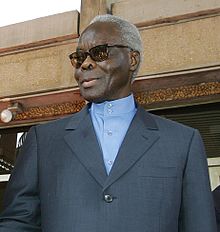Mathieu Kérékou
| Mathieu Kérékou | |
|---|---|

Kérékou in 2006
|
|
| President of Benin | |
|
In office 26 October 1972 – 4 April 1991 |
|
| Preceded by | Justin Ahomadégbé-Tomêtin |
| Succeeded by | Nicéphore Soglo |
|
In office 4 April 1996 – 6 April 2006 |
|
| Preceded by | Nicéphore Soglo |
| Succeeded by | Thomas Boni Yayi |
| Personal details | |
| Born |
2 September 1933 Kouarfa, French Dahomey |
| Died | 14 October 2015 (aged 82) Cotonou, Benin |
| Political party | People's Revolutionary Party of Benin (1975–90) |
| Religion | Evangelical Christianity (formerly lapsed Roman Catholic, briefly Islam) |
| Ethnic group | Somba |
Mathieu Kérékou [ma.tjø ke.ʁe.ku] (2 September 1933 – 14 October 2015) was President of Benin from 1972 to 1991 and again from 1996 to 2006. After seizing power in a military coup, he ruled the country for 19 years, for most of that time under an officially Marxist–Leninist ideology, before he was stripped of his powers by the National Conference of 1990. He was defeated in the 1991 presidential election, but was returned to the presidency in the 1996 election and controversially re-elected in 2001.
Kérékou was born in 1933 in Kouarfa, in north-west French Dahomey. After having studied at military schools in modern-day Mali and Senegal, Kérékou served in the military. Following independence, from 1961 to 1963 he was an aide-de-camp to Dahomeyan President Hubert Maga; following Maurice Kouandété's seizure of power in December 1967, Kérékou, who was his cousin, was made chairman of the Military Revolutionary Council. After Kérékou attended French military schools from 1968 to 1970, Maga made him a major, deputy chief of staff, and commander of the Ouidah paratroop unit.
Kérékou seized power in Dahomey in a military coup on 26 October 1972, ending a system of government in which three members of a presidential council were to rotate power (earlier in the year Maga had handed over power to Justin Ahomadegbé).
During his first two years in power, Kérékou expressed only nationalism and said that the country's revolution would not "burden itself by copying foreign ideology ... We do not want communism or capitalism or socialism. We have our own Dahomean social and cultural system." On 30 November 1974, however, he announced the adoption of Marxism-Leninism by the state. The country was renamed from the Republic of Dahomey to the People's Republic of Benin a year later; the banks and petroleum industry were nationalized. The People's Revolutionary Party of Benin (Parti de la révolution populaire du Bénin, PRPB) was established as the sole ruling party. In 1980, Kérékou was elected president by the Revolutionary National Assembly; he retired from the army in 1987.
...
Wikipedia
